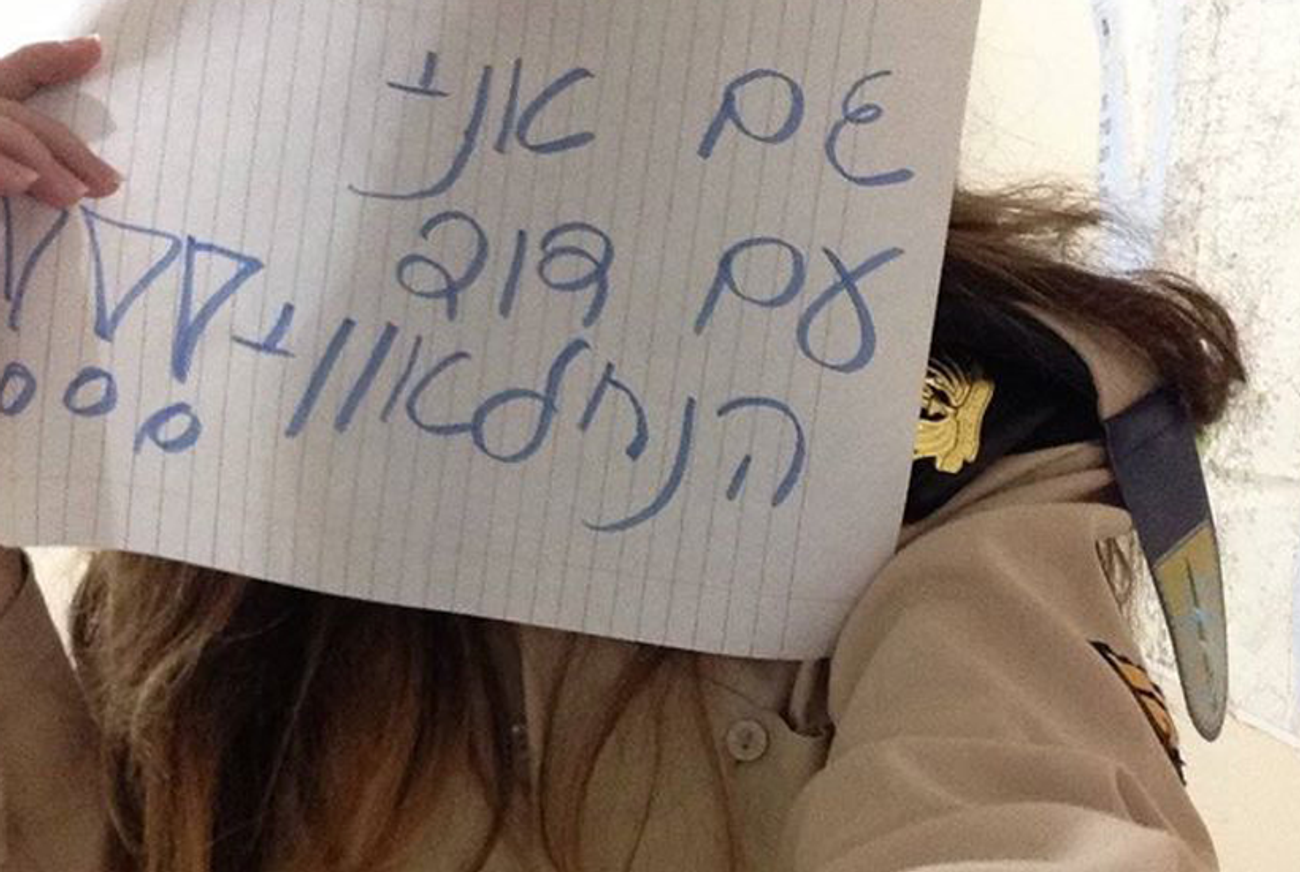The IDF Is Among the Greatest Armies in the World. But Can It Fight Facebook?
A social media mutiny is sweeping Israeli soldiers, leaving their commanders clueless




When the history of the Israel Defense Forces in the modern era is compiled, it may turn out that among its most notable soldiers, generals like Ariel Sharon or Yitzhak Rabin, is a young man with a trendy buzz cut and a sweet smile named David Adamov.
Adamov is the subject of a virtual mutiny that has led thousands of Israeli soldiers to defy the army’s commands and take to Facebook to express their displeasure with military regulations they say give them too little leeway to react forcefully when they feel their lives are in danger. His unlikely ascent to folk prominence began late last month, when a video taken by Palestinian activists showed him getting into an altercation with a group of teenagers in Hebron: In the video, one Palestinian comes close to Adamov, refusing to back down; Adamov pushes him, but then when a second young Palestinian jumps from behind his back, Adamov cocks his weapon and waves it around. The Palestinian youths disperse. There’s some shoving and some shouting, but no one is hurt.
This sort of encounter happens every day in the West Bank. A decade ago, maybe even more recently than that, it would have been immediately forgotten. But when Adamov was debriefed following the incident, and sentenced to jail for earlier and unrelated disciplinary charges, he immediately became an Internet cause célèbre. Believing Adamov had been unfairly punished for his handling of the riotous Palestinians in Hebron, young soldiers, themselves accustomed to similar situations and frustrated with the byzantine restrictions they are ordered to meet before opening fire—restrictions they felt were put in place to protect the army’s public image, not their own physical safety—took to Facebook in solidarity.
Because the IDF, like most armies, bars its soldiers from expressing personal opinions on contentious matters while in uniform, they covered their faces with homemade signs. Most of these contained the exact same slogan: “I also stand with David the Nachlawi,” the latter being a reference to the Nachal, Adamov’s brigade. Within days, the number of active duty soldiers and officers standing with Adamov was in the thousands, and a Facebook page set up to aggregate all these outbursts of support registered more than 133,000 likes, a huge number by local standards.
Baffled, the army’s chief education officer, Brig. Gen. Avner Paz Tzuk, published an open letter to officers, instructing them to encourage their soldiers to share their grievances with their commanders rather than with their circle of virtual friends. “Using social networks is an inseparable part of the world we live in,” Paz Tzuk wrote. “It’ll be wrong, and there’s no intention, to categorically prohibit the IDF’s soldiers from using this medium and the tools of social interaction. But the IDF’s soldiers and its commanders are bound by instructions and norms expected of soldiers in the public sphere,” including refraining from partaking in a protest of a political or a military nature.
“You have the duty of performing hasbara among your soldiers and making it clear that the social network is a public space bound by all the military rules and regulations governing the activities and behaviors of soldiers in public,” Paz Tzuk continued. “Please use this incident as an educational opportunity to discuss social networks and the meaning of being soldiers in an army in a democratic state.”
Whatever educational opportunity might have arisen was quashed by growing waves of support for Adamov. Before too long, civilians joined in and posted pictures online declaring their sympathy, and politicians, including senior cabinet members like Minister of the Economy Naftali Bennett, took to the media to praise the young Nachlawi.
With the public din far from diminishing, the army’s top brass had no choice but to go on record and address the protest. Their comments only emphasized the extent to which the IDF, an army known for its impressive technological innovations, was unprepared for the simple challenge of disgruntled soldiers with smart phones. “There is no such thing as a Facebook protest,” said the IDF’s spokesperson, Brig. Gen. Motti Almoz. “Protest is not a military concept. The IDF commands its soldiers via direct contact, by commanders talking to their subordinates. It’s not right to address these issues on Facebook, even if a lot of people got carried away.” Face-to-face communication, Almoz added, “is the only thing we know how to do, and the only way that’s right.”
That, however, is not currently the case in the IDF. In 2011, Brig. Gen. (res.) Yitzhak Brik, the army’s ombudsman, submitted his annual report to the Knesset, warning that the preponderance of electronic communications was causing chaos in all ranks. Instead of obeying the orders of their direct supervisors, Brik said, officers often bypassed the direct chain of command by texting or emailing with more senior officials, which sometimes resulted in a lack of clarity. “Because of the text message culture,” Brik warned, “we’ll lose the next war.”
Facebook’s surging popularity posed additional challenges to the traditional dictates without which no strong and disciplined military hierarchy is possible. From dancing the Harlem Shake to posting nude photographs, the IDF’s soldiers, like young people all around the world, see the social network as a repository for the amusing, the distinctive, the audacious, and the deeply personal; despite smatterings of punishment here and there, the army is discovering that it is more or less powerless against their eruptions of creative expression.
Officially, the IDF continues to walk a fine line, refraining from an all-out ban on social media on the one hand and insisting that soldiers and officers curb their enthusiasms online on the other. Speaking about the Adamov case days after it seized the front pages of Israel’s newspapers, the Chief of Staff, Lt. Gen. Benny Gantz, had very little to say about what response, if any, the army had in mind. “We will examine the way in which [Adamov] was treated and we will learn the appropriate lessons,” Gantz said. “It is important to remember and unequivocally reiterate to our subordinates that Facebook is not a commander’s tool. It’s here, and it’s a fact, but it is not a replacement for, or the equivalent of, a conversation between commanders and their soldiers.”
But such a guarded attitude, some say, is missing the point. “The military and government officials haven’t realized what the people, and especially the younger generation, have already figured out—control over information, and particularly its distribution, is no longer in the hands of the authorities,” said Danny Seaman, the former director of the Government Press Office and a retired senior hasbara official.
This, he added, will have implications that go well beyond the army itself: “The people now have the means to influence and determine the flow of information. We are in the midst of this revolution and an evolution where the presentation of the country’s image is on the hands of the public. A few years from now no one will understand how public diplomacy was ever run by the government.”
For now, the question remains how the IDF plans to react once the next social media crisis breaks out. Sources knowledgeable about the matter, speaking on background, admitted that there is currently no comprehensive plan being considered to regulate any upcoming outpouring of unauthorized opinions, images, etc. It is funny to imagine that, in the end, the Israeli army’s most formidable challengers may turn out to be not Hamas or Iran but Twitter and Facebook.
***
Like this article? Sign up for our Daily Digest to get Tablet Magazine’s new content in your inbox each morning.
Liel Leibovitz is a senior writer for Tablet Magazine and a host of the Unorthodox podcast.
Liel Leibovitz is editor-at-large for Tablet Magazine and a host of its weekly culture podcast Unorthodox and daily Talmud podcast Take One. He is the editor of Zionism: The Tablet Guide.